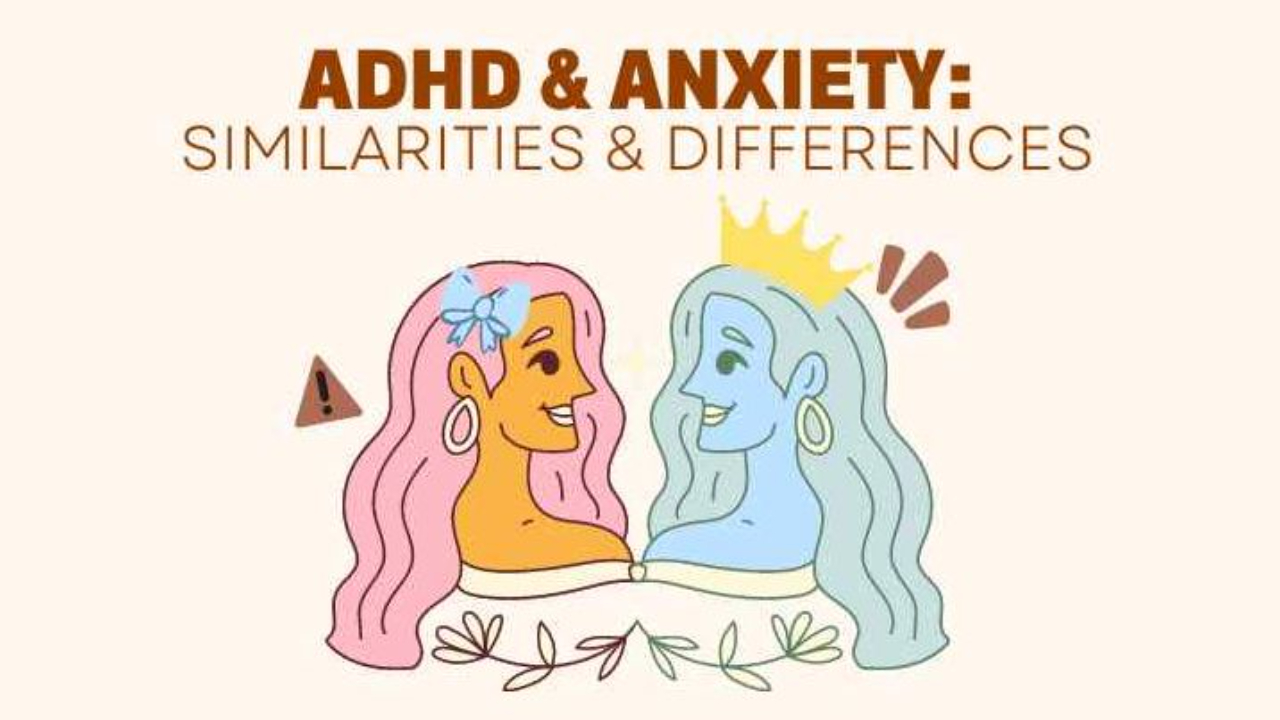ADHD & Anxiety: Similarities & Differences
Mar 06, 2023
Disclaimer: Life is inherently challenging and anxiety at different times is to be expected, this doesn't correlate to the diagnosis of a medical condition. A great rule of thumb is that if you anxiety or suspected ADHD symptoms are strong to the point of disrupting your life, then please seek professional support.
Before being diagnosed with ADHD in my late 20's, I'd been navigating the world with a brain that operates differently WITHOUT even being aware of those differences. I'd been diagnosed with severe anxiety for a number of years by this point and boy, did I feel that.
One of the more common misconceptions of ADHD is that it's predominantly hyperactivity and distractibility. But, one of the most common and agonising issues people with ADHD can face is anxiety, as the two often overlap. Whether the anxiety is caused by the lingering feeling of being "different", feeling like you have to constantly mask your ADHD symptoms, or due to life experiences, it can be one hell of a hurdle face.
Anxiety isn't a direct symptom of ADHD, but is a common co-morbidity that'll often present alongside it. This means that while anxiety and ADHD are two separate conditions, they can often occur together and have an impact on each other. Think of this like a game of mental and emotional tennis.
People with ADHD can often experience anxiety given the challenges and difficulties we face, such as trouble with organisation, time management, and impulsivity. Feeling like you're not great at daily tasks or even a "failure" isn't exactly great for self esteem.
Anxiety and ADHD can often present with similar symptoms, making it difficult to tell the two apart. Some shared symptoms can include:
-
Difficulty focusing: Both anxiety and ADHD can make it tricky to concentrate, particularly on tasks that require sustained attention.
-
Restlessness: People with either or both may find it hard to sit still or feel like they need to be constantly on the move. This movement can be part of how the nervous system regulates itself, like jiggling your knee or fidgeting.
-
Trouble sleeping: Sleep disturbance is common in both ADHD and anxiety. A racing mind isn't exactly a lullaby.
-
Procrastination: Both conditions can make it hard to start or complete tasks, leading to feelings of frustration and overwhelm.
However, understanding the differences between ADHD and anxiety is essential to ensure that appropriate care is sought and received. Despite many similarities, key differences are important to understand.
Anxiety and ADHD do differ:
-
Source of stress: Anxiety is often related to worry and fear about the future or past events, whereas ADHD-related stress is typically related to difficulties with organisation, time management, and prioritising tasks. (This doesn't mean you can't have both, but that they are two distinctive conditions overlapping)
-
Physical symptoms: Anxiety can often cause physical symptoms such as rapid heartbeat, sweating, and trembling, while ADHD does not typically present with physical symptoms (though ADHD medication may have similar side effects).
-
Timing of symptoms: ADHD symptoms are usually present consistently over time, while anxiety symptoms may come and go or be triggered by specific events or situations. ADHD and anxiety symptoms can both be exaggerated by other pressures, such as a lack of sleep, alcohol and poor self care.
-
Treatment options: While both anxiety and ADHD can be treated with therapy and medication, the specific treatments may differ. For example, cognitive-behavioral therapy (CBT) is often used to treat anxiety, while ADHD may be treated with therapy and medication such as stimulants or non-stimulants.
In my own journey, recognising that while anxiety and ADHD can often overlap and share symptoms, there are key differences between the two has helped me to address different struggles I face and better manage my mental health.
If you or a loved one are currently struggling with anxiety or ADHD-like symptoms, it's essential to recognise what may be at play and seek professional care. By working with a mental health professional, you can learn coping strategies to manage both anxiety and ADHD symptoms and improve your overall quality of life.
Stay gorgeous,
Dannielle
Want more regular-ish goodness?
Sign up for more ADHD, anxiety & relationship emails plus be the first to hear of offers and more!
We hate SPAM. We will never sell your information, for any reason.

